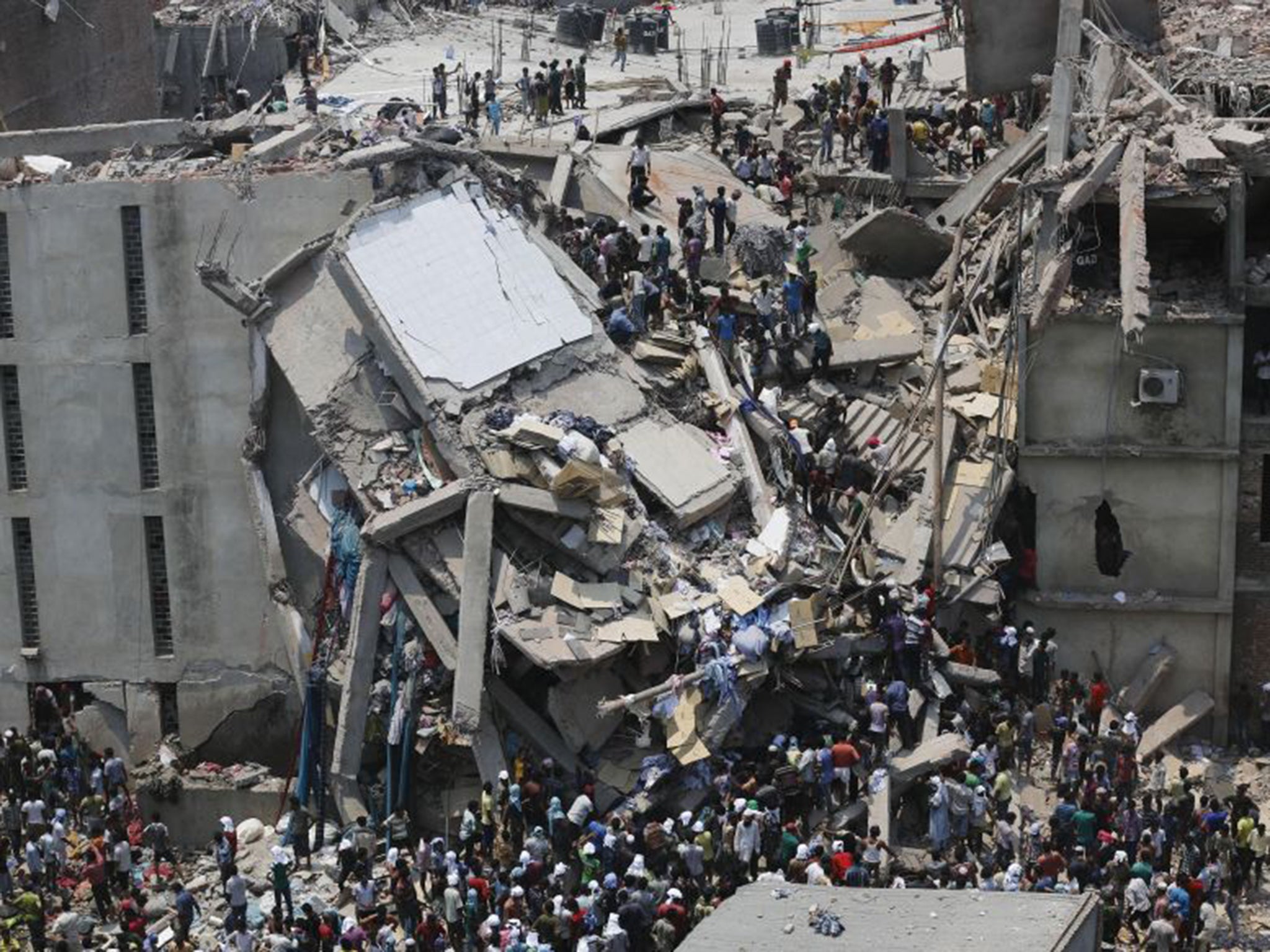Bangladeshi factory collapse: Clothing companies fail to pay into Rana Plaza fund that provides compensation for victims of 2013 disaster
Two years on, around one-third of the 32 firms that campaigners claim have links to the complex have yet to pay out

About a dozen clothing companies linked to the Rana Plaza factory in Bangladesh – which collapsed killing more than 1,100 people – have yet to pay a penny into a fund for victims, campaigners claim.
Pressure is mounting this week on the firms, the majority in Europe or the US, as next Friday marks the second anniversary of the tragedy in which 1,138 people were killed and more than 2,000 were injured. The eight-storey complex in Dhaka, which housed several clothing factories, collapsed in one of the world’s worst industrial disasters.
Amid claims and concerns of a sweatshop culture in Bangladesh – in which workers apparently had virtually no rights and health and safety was largely absent – the tragedy highlighted the human cost of cheap clothing.
While some companies linked to the factory complex, including Primark, were quick to pay millions towards compensation for victims and their families, many have yet to make any contribution.
Others, such as Benetton, have confirmed their donation after two years. The Italian clothing giant announced last week it would donate $1.1 m (£736,000) towards the fund, following a previous donation of $500,000 the company made before the current fund was set up. Yet this is far short of the $5m that campaigners claimed it should pay because of its size and ability to contribute.
Fashion Revolution Day marks the anniversary of the Rana Plaza factory collapse
Show all 13About one-third of the 32 companies that campaigners claim have links to the factory complex have yet to pay into the Rana Plaza Donors Trust Fund, set up to compensate victims and their families, according to a briefing by the Trade Union Advisory Committee (Tuac).
Consequently it is facing a shortfall of millions of pounds, depriving thousands of victims of the money they should have received. The fund, backed by the UN’s International Labour Organisation, should be about $30m, but less than $23m has been donated to date, which means that at least 5,000 people eligible for compensation will end up with only 70 per cent of what they are expecting. The amounts being given to individuals will vary depending on their circumstances, such as the number of dependants they have and the wages earned by workers who were killed or injured.
“Companies have either made donations smaller than the amount required, or have failed to make any contribution at all,” the briefing stated.
In an effort to pressure firms into paying up, Jean Lambert, Green Party MEP for London, has sent letters calling on them this month to contribute to the fund. Ms Lambert, the chair of the European Parliament’s South Asia delegation, said: “Many will be appalled that the compensation fund is still underfunded by about a third, so full compensation has not yet been paid – adding to the suffering. It is deeply upsetting that a number of brands linked to manufacturing at Rana Plaza have not yet contributed to the fund or made the level of their contribution transparent.”
Ilona Kelly, the campaigns director of Labour Behind the Label, said: “It is disgraceful that two years after the Rana Plaza disaster we are still having to campaign for compensation and some brands have yet to pay a penny into the compensation fund.”
Most of the companies approached by The Independent on Sunday did not respond to requests for comment. A spokesperson for the German firm Adler Modemärkte denied “any direct business links to companies operating in the Rana Plaza Complex”, and that while the company “supports” the principle of providing compensation, in 2013 it “decided to provide emergency assistance to victims and survivors via their own trusted contacts in the country” in what has become “a long-term and structured initiative”.
The Danish firm PWT “did not produce at the factory when it collapsed, but we had produced at the factory before”, according to a company spokesperson, and donated “a significant six–figure sum to the victims of the disaster” before the fund was established.
Subscribe to Independent Premium to bookmark this article
Want to bookmark your favourite articles and stories to read or reference later? Start your Independent Premium subscription today.

Join our commenting forum
Join thought-provoking conversations, follow other Independent readers and see their replies